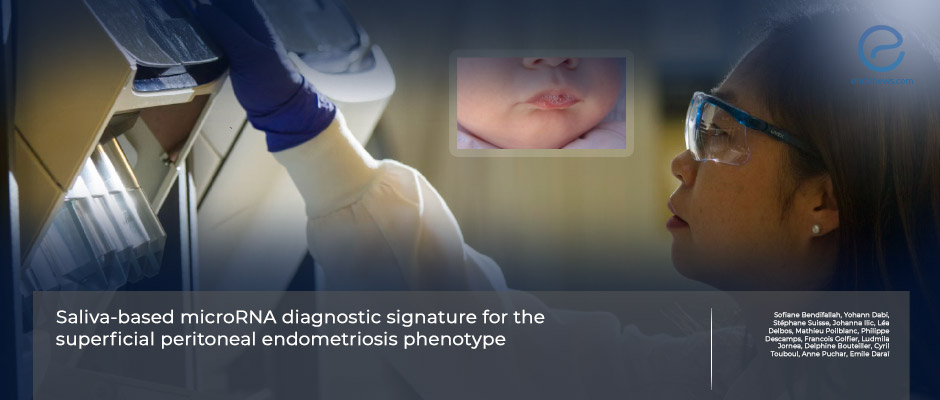microRNA signatures as a non-invasive diagnostic tool for peritoneal endometriosis
Jun 20, 2024
MiRNA signatures derived from the saliva may help to diagnose early endometriosis
Key Points
Highlight
- Saliva-based microRNA (miRNA) signature as a non-invasive biomarker is highly specific and sensitive in helping diagnose peritoneal endometriosis.
Importance
- The peritoneal endometriosis is particularly challenging owing to its asymptomatic or non-specific presentation.
- Salivary miRNA expression is noted to be a reproducible and accurate diagnostic tool.
What’s done here
- Using the saliva samples from the ENDOmiARN study cohort, researchers from France conducted a study to assess the diagnostic accuracy of miRNA signatures in patients with peritoneal endometriosis.
- miRNA biomarkers were identified with next-generation sequencing and models were created for the saliva miRNA signature for the SPE phenotype.
Key results
- Samples of 153 patients were evaluated and 2633 miRNAs were found.
- 89 miRNA signatures were associated with the diagnosis of peritoneal endometriosis.
- miR-4421, miR-3153, miR-3974, miR-4632-3p, miR-4674, miR-6511a-5p, and miR-190a-5p were the most important ones among the detected miRNAs.
- The involved main signaling pathways were PI3K/Akt and Wnt/β-catenin, VEGF, MAPK, and NF-KB.
Limitations
- Possible bias due to results being obtained from an analysis done on a subpopulation of the ENDOmiARN cohort
- The small sample size of peritoneal endometriosis patients, the age range of 18-43 that does not include many adolescents, and the overlap of certain miRNAs over different subtypes are main limitations.
Lay Summary
Using microRNA (miRNA) signatures obtained from bodily fluids as a non-invasive diagnostic tool for endometriosis has recently emerged as a useful method. Endometriosis remains an underdiagnosed disease, especially with subtypes such as peritoneal endometriosis which presents with non-specific symptoms.
Researchers from France led by Bendifallah et al. conducted a study using the prospective ENDOmiARN study cohort to evaluate the accuracy of this diagnostic method in saliva samples to identify endometriosis patients with the SPE subtype. The study results were published in the April 2024 issue of the European Journal of Obstetrics & Gynecology and Reproductive Biology.
Saliva samples from 153 patients with confirmed endometriosis diagnoses were taken and miRNAs were isolated. A set of miRNA biomarkers were identified using next-generation sequencing and Random Forest models were created for the saliva miRNA signature regarding the SPE phenotype. These were then tested and statistically analyzed in terms of sensitivity, specificity, accuracy, and reproducibility. Sixteen patients had the peritoneal endometriosis phenotype. The number of previously known miRNAs was 2633, and 89 were found to be associated with the diagnosis of peritoneal endometriosis. Seven were of particular importance: miR-4421; miR-3153; miR-3974; miR-4632-3p; miR-4674; miR-6511a-5p; miR-190a-5p. The authors stated that 31.5% of these miRNAs with peritoneal endometriosis signatures have never been reported before, whereas, others were found to be related to various pathophysiological pathways. These miRNAs were involved in the main signaling pathways of PI3K/Akt and Wnt/β-catenin, VEGF, MAPK, and NF-KB.
The authors discuss that although there are studies regarding different miRNA signatures in endometriosis patients, none focused on the peritoneal endometriosis diagnosis specifically. They add that salivary miRNA expression is reproducible and accurate, therefore a salivary test should be included with other diagnostic testing. This is especially important in young patients with whom a reluctant approach is being taken considering the laparoscopic procedures because of the age group. The authors conclude by saying that miRNA signatures to diagnose peritoneal endometriosis phenotype could be a new non-invasive tool even though the use of biomarkers to diagnose endometriosis is not currently recommended by the latest guidelines.
Research Source: https://pubmed.ncbi.nlm.nih.gov/38677096/
endometriosis superficial peritoneal endometriosis saliva microRNA

